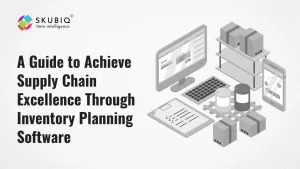In the dynamic landscape of retail, where consumer preferences and shopping behaviors continually evolve, adopting a robust omnichannel retail strategy has become imperative for businesses aiming to stay competitive. This comprehensive approach not only integrates various sales channels but also synchronizes back-end operations seamlessly. In this article, we will explore the key elements and steps involved in developing a winning omnichannel retail strategy, touching upon crucial aspects like omni-channel supply chain, omni-channel inventory management, and the role of advanced retail supply chain management solutions.
Understanding the Foundation: Omni-channel Retail Strategy
A successful omni-channel retail strategy is built on the foundation of providing a unified shopping experience across multiple channels, both online and offline. It requires a holistic approach that seamlessly connects different touchpoints, ensuring a consistent and personalized experience for customers. The strategy extends beyond sales channels, encompassing the entire retail supply chain.
Omni-channel Inventory Management and Real-Time Stock Visibility
One of the cornerstones of a robust omni-channel retail strategy is efficient omni-channel inventory management. Businesses need to implement advanced retail inventory management software that enables real-time visibility into stock levels across all channels. This not only prevents stockouts and overstocks but also ensures that customers can access accurate information about product availability, both online and in-store.
Investing in cutting-edge retail inventory management software allows for centralized control, streamlining the tracking and management of inventory. With real-time stock updates, businesses can make data-driven decisions to optimize stock levels, reduce holding costs, and enhance the overall efficiency of the retail supply chain.
Seamless Integration: Multi-Channel Retailing and Multi-Channel Integrations
To implement a winning omni-channel retail strategy, it’s crucial to embrace multi-channel retailing and ensure smooth multi-channel integrations. This involves integrating various sales channels, such as brick-and-mortar stores, e-commerce platforms, mobile apps, and social media platforms. Each channel should complement the others, creating a unified brand experience for the consumer.
Multi-channel integrations extend beyond just sales channels. They involve connecting diverse functions within the business, including sales, marketing, customer service, and fulfillment. A seamless flow of information between these channels ensures a cohesive and responsive customer experience.
Strengthening the Backbone: Omni Channel Supply Chain and Omni Channel Distribution
A successful omni-channel retail strategy relies heavily on a robust omni-channel supply chain and efficient omni-channel distribution. This means creating a supply chain that can fulfill orders from various channels promptly. Implementing an omni-channel distribution system allows businesses to optimize inventory across the network and fulfill orders from the most strategically located sources, minimizing delivery times and costs.
The omni-channel supply chain should be agile and responsive, capable of adapting to shifts in consumer demand and market trends. Real-time data analytics play a crucial role in identifying patterns and making proactive adjustments to the supply chain. This data-driven approach ensures that the omni-channel retail strategy remains adaptable and aligned with customer expectations.
The Role of Technology in Retail Chain Management System
Implementing a state-of-the-art retail chain management system is fundamental to the success of an omni-channel retail strategy. This system acts as the backbone that supports and integrates various components of the strategy. A robust retail chain management system should provide end-to-end visibility, from the manufacturer to the end consumer.
Automation is a key feature of an effective retail chain management system. Automating routine tasks, such as order processing, inventory tracking, and data analysis, frees up valuable human resources to focus on strategic initiatives and customer engagement. Artificial intelligence and machine learning algorithms can analyze vast amounts of data, providing valuable insights for decision-making and enhancing the overall efficiency of the omni-channel retail strategy.
Steps to Develop a Winning Omni-channel Retail Strategy
1. Comprehensive Analysis
Before implementing an omni-channel retail strategy, conduct a thorough analysis of your current operations, customer behaviors, and market trends. Identify the strengths, weaknesses, opportunities, and threats that could impact your strategy.
2. Customer-Centric Approach
Center your strategy around the customer. Understand their preferences, shopping habits, and expectations. A personalized and seamless experience across all channels is key to customer satisfaction and loyalty.
3. Invest in Technology
Embrace advanced technologies, such as AI-driven analytics and automation tools, to streamline operations and enhance the overall efficiency of your retail chain management system.
4. Training and Employee Engagement
Ensure that your staff is well-trained to handle the intricacies of omni-channel retail. Engage employees in the transition, emphasizing the benefits of the strategy and how it positively impacts their roles.
5. Real-Time Analytics
Implement real-time analytics to monitor the performance of your omni-channel retail strategy continually. Analyzing data allows for quick adjustments and improvements based on emerging trends and customer feedback.
6. Agile Supply Chain
Develop an agile omni-channel supply chain that can adapt to changes in demand and market conditions swiftly. This involves leveraging technology, data, and collaboration with suppliers to optimize the entire supply chain.
7. Seamless Integration:
Ensure that all channels and functions within your business are seamlessly integrated. From marketing and sales to fulfillment and customer service, a unified approach is essential for the success of your omni-channel retail strategy.
8. Continuous Optimization
The retail landscape is dynamic, and consumer preferences evolve. Regularly assess and optimize your omni-channel retail strategy to stay ahead of the curve. This includes staying informed about technological advancements and industry trends.
Conclusion
In the ever-evolving world of retail, a winning omni-channel retail strategy is a must for businesses aiming to thrive. From embracing advanced technologies and automating processes to developing an agile omni-channel supply chain, each element plays a crucial role in creating a seamless and customer-centric experience.
By focusing on keywords such as omni-channel retail strategy, omni-channel supply chain, omni-channel inventory management, and leveraging technologies like retail inventory management software, businesses can position themselves for success in the competitive retail landscape. As the retail industry continues to transform, staying adaptable and customer-focused will be the key to sustained success.




